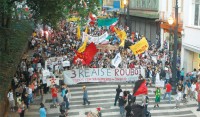 Toronto The work of the Free Fare Movement in Brazil has triggered mass movements and mobilizations for change in Brazil. The simplest of their demands, reducing what is reportedly a somewhat modest fare increase, has already been met in the major cities of Sao Paolo and Rio de Janeiro, but as the numbers have increased, the demands for change have escalated to focus more on the mismatch of priorities in governmental infrastructure spending on too many circuses and not enough bread.
Toronto The work of the Free Fare Movement in Brazil has triggered mass movements and mobilizations for change in Brazil. The simplest of their demands, reducing what is reportedly a somewhat modest fare increase, has already been met in the major cities of Sao Paolo and Rio de Janeiro, but as the numbers have increased, the demands for change have escalated to focus more on the mismatch of priorities in governmental infrastructure spending on too many circuses and not enough bread.
Several months ago I asked a Brazilian friend and filmmaker traveling to visit family in Rio if she would write something for Social Policy on whether or not there were organizations challenging the preparations for the World Cup and Olympics in Brazil and their expenditures on that as well as the police actions in the favelas. She came back with apologies. She couldn’t piece it together. Mayara Vivian, one of the founding organizers of the Free Fare Movement when it began at a small conference of 200 people in Porto Alegre in 2005, was as surprised, as she and others started organizing protests against the fare increase. According to an informative piece in the Times by Simon Romero and William Neuman,
Ms. Vivian, now a waitress and geography student who was bleary-eyed from lack of sleep after days of continuous protests, laughed when she thought about her early days as an organizer: “In 2005 we were a bunch of kids who had never organized any kind of demonstration.” Without the organizing grunt work over the years, she and others said, the stage for the current wave of protests would not have been set. Still, Ms. Vivian and her fellow activists could not explain the change that had suddenly brought huge crowds into the streets all around the country.
But that’s what makes a movement different than normal organizing. In Brazil, people are coming out in huge numbers. Something like Occupy had broad range throughout the US, but small participation largely because of the tactical limitation of encampments which couldn’t engage a mass base. The India, anti-corruption turnout numbers were massive, but were less about the rage of inequality than an emerging middle class upset about the clash between their rising sense of entitlement and their issues with the public bureaucracy and its lack of political action against corruption. In Greece, the protests have been prompted by external demands for austerity. Every one of these movements has been different, but in each case they have tapped deep wells of anger, and in Egypt and Brazil may lead to change.
Also typical of a movement, other formations with longstanding grievances are seizing the opportunity to coalesce around larger movements for change and attach their demands to the new energy and mass base.
“One group of protesters from Complexo do Alemão — a patchwork of slums in Rio once seen as an epicenter of crime and drug trafficking — belonged to an organization called Occupy Alemão, created to demonstrate against police abuses. “We want a public security strategy that is made in dialogue with society,” said Raul Santiago, 24, a community organizer. “We have a high cost of living and precarious services. This is for basic rights. Look at how much is being spent on the Olympics.”
Finally, as we look for other lessons in Brazil we can even find some resonance with our work in seeking to create “citizen journalism” projects at KABF and in our organizing ACORN International. When confronted with the problem of mainstream media (or “lamestream” as Sarah Palin calls it), activists in Brazil are creating their own ways to get the real news out through websites and social media:
As an alternative, some protesters have begun covering the demonstrations themselves, distributing their reports though social media. One group, called N.I.N.J.A., a Portuguese acronym for Independent Journalism and Action Narratives, has been circulating through the streets with smartphones, cameras and a generator held in a supermarket cart — a makeshift, roving production studio.
Parts of that production are much older school than our friends in Brazil would realize. Every major ACORN demonstration used to have a supermarket cart and a couple of heavy duty batteries to run the loudspeakers for the chant leaders. Here they are using small generators but the idea is the same thanks to technology I learned from welfare rights more than 40 years ago.